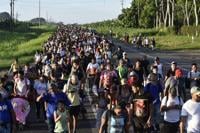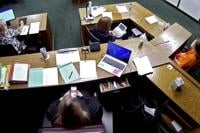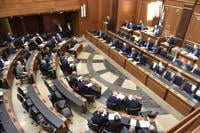BERLIN (AP) — The city of Berlin on Sunday held a court-ordered rerun of a chaotic 2021 state election that was marred by severe glitches at many polling stations and hours-long lines as some polling places ran out of ballot papers or received ones for the wrong district.
Exit polls showed the center-right Christian Democrats ahead with 27.5% of the vote, followed by the Social Democrats and the Greens, which both had 18.5%, according to public broadcaster ARD. The final results, along with coalition negotiations, will determine who serves as the mayor and state senators of Germany's capital.
Berliners have long been frustrated by the city's notoriously dysfunctional administration, which has defied cliches of German efficiency for years and made it the laughing stock of the rest of the country.
If the final results mirror the exit polling, it would be the first time in more than two decades that the center-right Christian Democratic Union emerged as the strongest party in Berlin. Kai Wegner, the party's top candidate, thanked Berliners for their votes and promised that “we will make Berlin work again.”
After the 2021 election, , who belongs to German Chancellor Olaf Scholz’s Social Democrats, led the city as Berlin's mayor in a three-party left-wing governing coalition with the Greens and the Left party. The 44-year-old was running again Sunday.
Giffey conceded after polls closed that “Berliners are not happy with the way things are now.” However, the exit polls leave open who will become Berlin’s next mayor as several different coalition options are possible.
The Constitutional Court of Berlin, one of three German cities that is also a state in its own right, declared the 2021 state vote invalid in November. It said a partial rerun wouldn’t be enough “in view of the large number and severity of the election errors.”
The decision followed complaints by several political parties and government entities over the Sept. 26, 2021, election for the state legislature.
Berlin held four votes that day: the state election, an election for the city’s 12 district assemblies, the German national election and a local referendum. The Berlin Marathon also took place the same day, added to the logistical difficulties.
Long lines formed outside many polling stations as voters struggled with extra ballot papers. Some polling stations ran out of ballots during the day, and others received ones for the wrong district, leading to a large number of invalidated votes.
Another issue was the election was supposed to end at 6 p.m., but voters waiting in line at that hour were allowed to cast their ballots even after the results of exit polls were made public.
The head of an international delegation of election observers said Sunday's repeated election appeared to be well-organized and proceeding smoothly.
“We are very satisfied with what we have seen,” Vladimir Prebilic, the head of the Council of Europe delegation, told German news agency dpa.
Among the most pressing issues in Sunday's election was the city's housing market. Rising rents and a housing shortage have made affordable living in the city center almost impossible for many middle-class families.
Berliners would also like to see an end to some of their city's frustrations.
Among the most teeth-grinding issues are the much-delayed and the near impossibility of getting an appointment with the city’s citizen centers to apply for a wedding license, register after a move or apply for a new passport.
The city’s school system is known for its notoriously dilapidated buildings and students who regularly rank at the bottom of the national scores when it comes to reading, math and other subjects.
Yet, despite the many complaints, the city’s 3.6 million residents also love their city which is praised for its tolerance, buzzing culture and night-life scene, and diversity.
Around 2.4 million people were eligible to vote in the rerun, but only 48.8% had cast ballots by 4 p.m., according to German news agency dpa.
___
Liv Stroud contributed reporting.














































